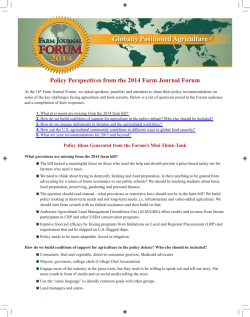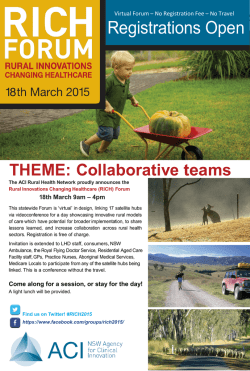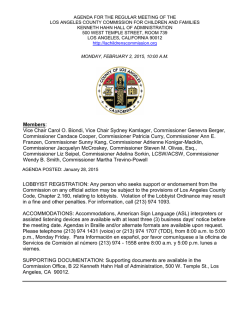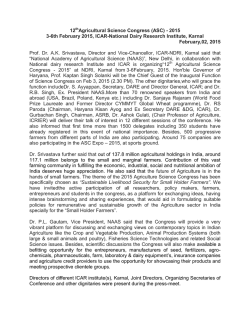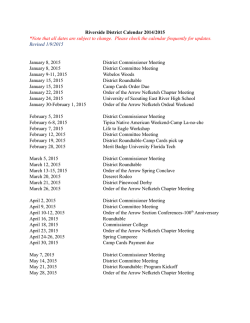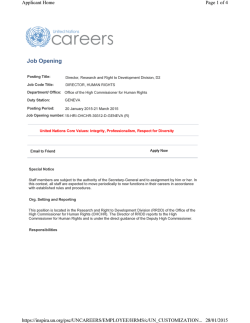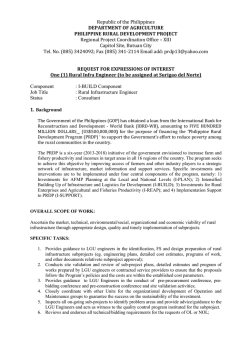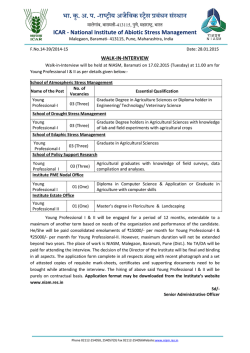
Speech by Commissioner Phil Hogan at World Food Day
Speech by Commissioner Phil Hogan at World Food Day Conference 13th October 2016, Brussels - Check Against Delivery – Ladies and gentlemen, Let me first of all thank Commissioner Moedas for his intervention. He has been leading from the front in making Food 2030 a reality. I salute him for the vision and effort he has poured into this collaboration. Last year, during the Expo in Milan, Carlos and I launched a long-term plan for European agriculture research and innovation. Today represents one of the early fruits from the seeds we planted that day. 1 Your mission today is to discuss how we can build on the current political momentum to make further progress. Gathered in this room we have a wide array of stakeholders such as farming organisations, food entrepreneurs, researchers, rural and urban authorities, private and public sector investment experts, advisers and rural development management authorities. Ultimately, what we hope to harvest is a coherent and visionary policy guiding research and innovation policy in the area of EU Food and Nutrition Security. As Carlos mentioned, in conjunction with today's event the Commission is launching a staff working document entitled 'European Research and Innovation for Food and Nutrition Security'. This document elaborates on the breadth and depth of our food systems, both local and global. It highlights the need for more and better research and innovation when it comes to our food systems. 2 And crucially, it acknowledges that sustainability must be the foundation for our future strategies in this area. My fellow Irishman John Bell will provide further details during the next session. The CAP is already playing a major role. This year, some €16.3 billion of the CAP budget will be geared towards climate and sustainability, with a strong emphasis on modernisation and innovation. This includes greening practices, ensuring, among other priorities, the maintenance of permanent grassland in Europe as an important carbon sink. It also covers funding under Rural Development to support farm modernisation to cut energy consumption, improve fertiliser use efficiency and further reduce greenhouse gas emissions. I believe it's important to remind ourselves why the use of innovation and research to improve both food yields and sustainability is so vital. Food and nutrition security is something that the vast majority of European citizens can take for granted. 3 Through our shared common agricultural policy, we have an integrated and well-funded mechanism which provides our citizens with the highest-quality food and drink products in the world. EU food is safe, nutritious, traceable and plentiful. And our food products will be needed in the coming years - with world population expected to increase to 9.1 billion by 2050, and an extra 3 billion people expected to join the middle classes over the next 20 years, it is estimated that the world will need to increase food production by 70% over 2005 levels. Meeting this demand would in itself be reason enough to build a stronger European blueprint for food research and innovation. But the reality is that we need it for much more than that. In today's world, our food security must not come at the price of environmental sustainability. Commissioner Moedas made this point very clearly and eloquently. 4 Our ongoing fight against climate change and environmental degradation requires our food production systems to become smarter, and greener. We have committed to being a global leader by setting ambitious targets for the COP21 Climate Agreement and the Sustainable Development Goals. And our agri-food sector must be empowered to lead from the front in this challenge. It's worth remembering that we have already come a long way: The CAP has helped to reduce GHG emissions from agriculture by 23% since 1990, and has reduced the level of nitrates in rivers by 17.7% since 1992. This is a clear indication that if farmers are incentivised and rewarded for their work, they can deliver across a wide range of policy areas. And we need them to deliver. Our society is facing a number of growing and critically important food-related challenges. 5 We know that Europe has every capacity to become a champion in environment and climate-smart agriculture. We have some of the world's leading agriculture research institutes, with decades of expertise. We have policymakers who are fully in tune with these challenges. The recent European Parliament reports by MEPs McIntyre and Huitema reports have been very positive contributions. They highlight the need for the Commission to stimulate the development and uptake of precision farming. They also urge the Commission to include innovation in any forthcoming review or reform. We know that we have the capacity and ingenuity to develop new solutions for keeping our soils healthy, our water clean, and our environment rich in species to keep away pests. However, I would add one proviso to your discussions. Please make sure that all your strategies keep the farmer at their centre. At the end of the day, it is the men and women working the land who must deliver. The CAP has always been, and continues to be, a farmer-oriented policy. 6 New methods and innovations must serve the greater societal good, but they must also serve the farmer's bottom line. Without a fair reward for their work, we cannot expect farmers to continue delivering food security as well as this broad spectrum of wider public goods. Therefore, I urge you to work towards solutions which reward the farmer. Production efficiency has a direct impact on the farmers wallet. They will be able to produce at lower costs and – with all other things being equal - farming income will increase. The fact that input use is reduced also means very positive resource implications for the environment. This is really a classic win – win situation. So let's look at the options for where we go from here. Carlos has outlined some of the choices available to us in the coming years. Many innovative solutions are already emerging across food systems and further advances in research and innovation will accelerate the rate of progress. 7 For example, digital technologies hold enormous promise for the agri-food sector and the food chain as a whole. Smart farming and precision agriculture are already changing the practices and business models for the most advanced farms and agri-businesses. In the last 10 years, precision agriculture has moved from good science to good practice and now in excess of 70 per cent of new equipment sold has some form of precision agriculture component inside. The most successful example of precision agriculture on arable land is the use of controlled traffic farming which has been able to reduce machinery and input costs by up to 75% in some cases, while also increasing crop yields. But there is still a large untapped potential in digital technologies for European farmers. Our European model of agriculture supports the family farm as well as the large-scale operator. So we need to see a wider uptake of research and innovation. 8 Big Data in combination with Precision Farming technologies can help farmers to optimize their operations and can lead to completely new business models in the agri-food sector. For example, the Internet of things brings connectivity and intelligence to existing products – apps already exist allowing a farmer to receive data on grass growth and animal health to his mobile phone. The development of the unmanned aerial vehicle industry is likely to benefit agriculture in numerous ways and not just for data gathering. Cattle monitoring and examination as well as crop sowing, fertilising, spraying and examination can all be accomplished by UAV's and an entire manufacturing industry is gearing up to get started in these areas. When I visited Ireland with Commissioner Moedas last year, we saw first-hand a multi-partner European project which helps farmers measure grass quantity more accurately, using ultrasonic sensors with recorded GPS co-ordinates. Our ambition must be to take technologies like the Internet of things or Big Data to the next level in the agri-food sector. 9 One clear way to achieve this is by investing in large scale demonstrators, which show in real life conditions how new technologies can benefit users of all sizes. I have attended numerous agricultural shows throughout Europe, and I have already seen many great examples of this. As you know, we are supporting the roll out of agri-tech under our rural development policy and Horizon 2020. These are initiatives which are specifically targeting the agrifood sector. If we take Horizon 2020, one good current example is the Large Scale Pilot on the Internet of Things. This is titled "Smart Farming and Food Security" and is included in the Horizon 2020 Work Programme for this year and next. Going beyond promising technologies and applications, I would like to stress the importance of building better territorial linkages in shaping our food systems. The urban-rural linkage is particularly important. In the context of the Circular Economy, we need to be smarter about how we use urban food waste. 10 Rebuilding producer-consumer relations and food supply chains, and the role of regional food systems was at the centre of a recent EIP-AGRI workshop on "Cities and Food – Connecting Consumers and Producers". This event brought together a wide array of stakeholders to orientate policies and programmes towards more sustainable food chains and to create common actions to establishing ‘local and healthy’ food systems. These are positive steps. But if we are really serious about fostering a culture of innovation at every echelon of our sector, we must strive to make research more demand-driven. Scientists, investors and agri-entrepreneurs need to involve farmers in the early stages of project design. Innovations must serve the farmer's need first and foremost. All the other benefits I mentioned earlier will flow from this. Therefore, we have put more emphasis in Horizon 2020 on innovation and interaction between science and practice through, among the others, 'multi-actor projects', involving not only researchers but also other players such as farmers and industry. 11 Under the Horizon 2020 Work programmes, around 500 million Euro have been dedicated to multi-actor projects from 2014 to 2017. To speed up innovation on the ground we established the European Innovation Partnership on "Agricultural Productivity and Sustainability". This bridges the gap between research and practice. More than 3000 innovation projects are in line to be funded under the Rural Development Programmes in the 2014-2020 period. I am very pleased that the EIP-AGRI has been taken up so widely by EU Member States and regions in their new Rural Development Programmes. These innovative co-operation projects involve farmers working together with other food chain actors, advisors and researchers top find concrete, practical solutions to particular problems. EIP innovation projects are tackling issues not only related to agriculture but the food chain as a whole. 12 For example the ENU-WHEAT project gathers all wheat value chain players to develop a sustainable and environmentally friendly wheat value chain. Other EIP Operational groups are working on novel food approaches ensuring food safety and reducing environmental pressure. I would also remind you that there are financial instruments available through the European Fund of Strategic Investment whose function is to provide loans to innovative companies with a potential for return on investment. Take-up has been low in the food innovation sector so far and must improve. As a Commissioner with double responsibility, for Agriculture and Rural development on one side and agricultural research and innovation on the other, it is clear to me that we will make progress when we link the right instruments and policies together. I am grateful to have in Commissioner Moedas a colleague who has the same positive and proactive approach to synergies. By linking our policy platforms together, they become stronger and better funded. 13 Integrating policy instruments as we have done with the EIPAGRI is turning out to be a powerful driver of agricultural innovation with a real impact on the ground. In conclusion, ladies and gentlemen, I think we can agree that our agricultural innovation system needs to be strengthened and further developed. We have already made some real and impressive progress. The political momentum is there for us to do even more. At political level in Europe, there is growing support for the establishment of an 'innovation principle' to encourage new legislation to be supportive of innovation. I encourage you to take this excellent opportunity to drive things on. I will be looking to your recommendations with interest. Thank you and good luck! 14
© Copyright 2026
